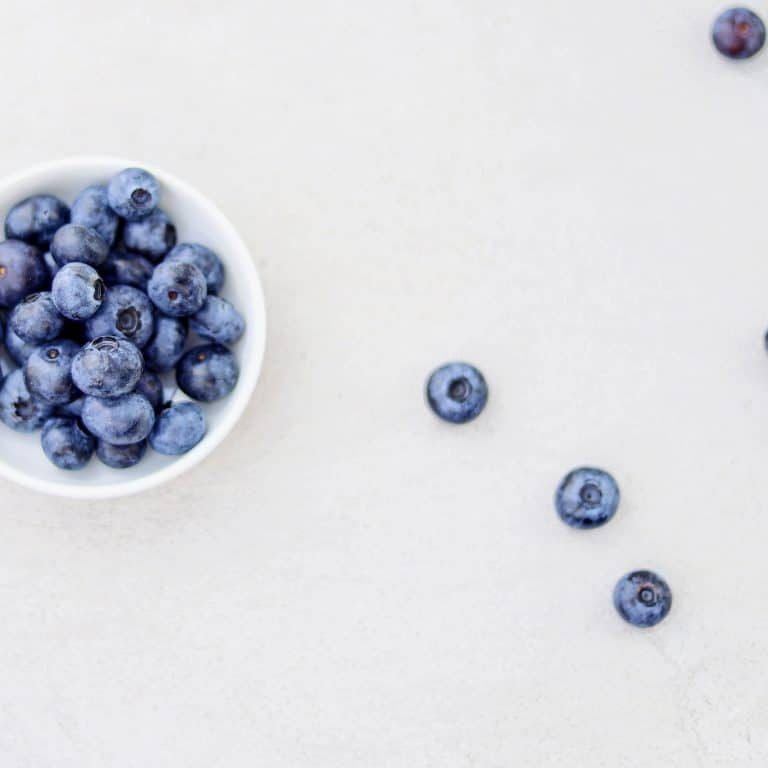Blueberries, often regarded as a superfood, have a history that intertwines with both ancient usage and modern scientific research. Native to North America, these small berries have been valued for centuries by Native Americans for their taste, nutrition, and medicinal properties. Today, science confirms what these indigenous cultures have long known: blueberries are a powerhouse of nutrients and antioxidants.
This blog post will explore the nutritional benefits of blueberries and their role in a health-conscious diet.

Nutritional Profile of Blueberries
A cup of fresh blueberries (about 148 grams) contains:
- Calories: 84 kcal (4.2% DV)
- Carbohydrates: 21 grams (7% DV)
- Dietary Fiber: 3.6 grams (14.4% DV)
- Vitamin C: 24% of the DV
- Vitamin K: 36% of the DV
Antioxidants content may vary:
- Anthocyanins: 120 to 163 milligrams
- Quercetin: 3 to 18 milligrams
- Myricetin: 0.3 to 6.5 milligrams
- Kaempferol: 0.5 to 5 milligrams
- Resveratrol: less than 1 milligram
General Health Benefits of Blueberries
Blueberries are celebrated for their health benefits:
- Rich in Antioxidants: Blueberries are loaded with antioxidants like anthocyanins, which reduce oxidative stress and may lower the risk of chronic diseases.
- Supports Heart Health: Regular consumption of blueberries has been linked to improved heart health and a reduced risk of heart disease.
- Brain Health: Studies suggest that blueberries can enhance cognitive function and may slow age-related decline in brain health.
Science Behind Blueberries
Blueberries are supported by scientific research. Key findings include:
- Anthocyanins and Cardiovascular Health: Blueberries contain anthocyanin pigments which contribute significantly to their health benefits. Regular, moderate intake of blueberries is associated with a reduced risk of cardiovascular disease, type 2 diabetes, and improved weight maintenance and neuroprotection. These benefits are attributed to their anti-inflammatory and antioxidant actions, and beneficial effects on vascular and glucoregulatory function (Kalt et al., 2019).
- Potential for Treating Obesity and Diabetes: Blueberries, rich in vitamins, phenolic acid, and anthocyanins, show potential in ameliorating obesity and related comorbidities like type 2 diabetes (T2D) and chronic inflammation. They help counteract oxidative stress, regulate glucose metabolism, improve lipid profiles, and lower inflammatory cytokine levels (Shi et al., 2017).
- Neurological Benefits: Blueberries may improve learning and memory in children, and their anthocyanins play a major role in neuroprotection. However, anthocyanins have poor bioavailability, indicating the importance of consumption forms for maximizing health benefits (Tran & Tran, 2021).
- Variety in Phytochemical Profiles: Different varieties of blueberries show significant variations in their total antioxidant activities and cellular antioxidant activities, underscoring the importance of variety selection for specific health benefits (Wang et al., 2017).
- Endothelial Function Improvement: Blueberry supplementation has been observed to improve endothelial function in adults with metabolic syndrome, although it does not significantly affect blood pressure (Stull et al., 2015).
Cooking with Blueberries
Blueberries are versatile in the kitchen. They can be eaten fresh, added to cereals, yogurt, or salads, and used in baking. Cooking blueberries, such as in baking or making jams, can alter some nutrients but still retains many health benefits.
Healthy Blueberry Recipes
- Blueberry Smoothie: Blend blueberries with yogurt, a banana, and a splash of almond milk for a nutritious smoothie.
- Blueberry Pancakes: Add blueberries to your pancake batter for a burst of flavor and antioxidants.
- Blueberry Salad: Toss fresh blueberries in a spinach salad with nuts and a vinaigrette dressing.
Blueberry Sustainability
Blueberries serve as a sustainable agricultural choice, owing to their efficient water usage and eco-friendly cultivation practices. Mature blueberry plants are relatively water-efficient, making them a suitable crop in areas prone to drought. In terms of pest management, blueberry farmers often adopt integrated pest management (IPM) techniques, minimizing the dependence on harmful chemical pesticides in favor of more natural solutions. This approach supports a healthier ecosystem.
Furthermore, blueberry bushes are pollinator-friendly, playing a role in sustaining bee populations, crucial for biodiversity and environmental balance. Additionally, blueberries can be grown in acidic soils, often unsuitable for other crops, thereby optimizing land use. Their perennial nature also aids in carbon sequestration, contributing positively to carbon reduction initiatives.
Blueberries vs. Other Berries

Comparing blueberries to a less nutrient-dense berry like the strawberry highlights their superior profile. Blueberries are known for their high antioxidant content, particularly rich in anthocyanins, which contribute to their deep blue hue and are linked to numerous health benefits. In contrast, strawberries offer higher vitamin C but fall behind in other nutrients. Blueberries also have a greater concentration of Vitamin K and manganese, crucial for bone health and metabolic functions, and boast a higher fiber content, which is beneficial for digestive health and blood sugar regulation. While strawberries are nutritious in their own right, blueberries have a lower calorie count per serving and a higher overall nutrient density, making them a slightly better choice for those seeking a nutrient-packed berry option.
Conclusion
Blueberries are not just a delicious fruit; they are rich in vitamins, fiber, and antioxidants. Their role in enhancing heart and brain health, combined with their historical roots and versatility in cooking, makes blueberries a valuable addition to a healthy diet.
References
- Kalt, W., Cassidy, A., Howard, L., Krikorian, R., Stull, A., Tremblay, F., & Zamora-Ros, R. (2019). Recent research on the health benefits of blueberries and their anthocyanins. Advances in Nutrition, 11, 224-236.
- Rodriguez-Mateos, A., Istas, G., Boschek, L., Feliciano, R., Mills, C., Boby, C., Gómez-Alonso, S., Milenkovic, D., & Heiss, C. (2019). Circulating anthocyanin metabolites mediate vascular benefits of blueberries: Insights from randomized controlled trials, metabolomics, and nutrigenomics. The Journals of Gerontology: Series A, 74(7), 967-976.
- Basu, A., Du, M., Leyva, M., Sanchez, K., Betts, N., Wu, M., Aston, C., & Lyons, T. (2010). Blueberries decrease cardiovascular risk factors in obese men and women with metabolic syndrome. The Journal of Nutrition, 140(9), 1582-1587.
- Silva, S., Costa, E., Veiga, M., Morais, R., Calhau, C., & Pintado, M. (2018). Health-promoting properties of blueberries: A review. Critical Reviews in Food Science and Nutrition, 60, 181-200.
- Shi, M., Loftus, H., McAinch, A., & Su, X. (2017). Blueberry as a source of bioactive compounds for the treatment of obesity, type 2 diabetes, and chronic inflammation. Journal of Functional Foods, 30, 16-29.
- Stull, A., Cash, K., Champagne, C., Gupta, A., Boston, R., Beyl, R., Johnson, W., & Cefalu, W. (2015). Blueberries improve endothelial function, but not blood pressure, in adults with metabolic syndrome: A randomized, double-blind, placebo-controlled clinical trial. Nutrients, 7(6), 4107-4123.
- Krikorian, R., Shidler, M., Nash, T., Kalt, W., Vinqvist-Tymchuk, M., Shukitt-Hale, B., & Joseph, J. (2010). Blueberry supplementation improves memory in older adults. Journal of Agricultural and Food Chemistry, 58(7), 3996-4000.
- McAnulty, L., Nieman, D., Dumke, C., Shooter, L., Henson, D., Utter, A., Milne, G., & McAnulty, S. (2011). Effect of blueberry ingestion on natural killer cell counts, oxidative stress, and inflammation prior to and after 2.5 h of running. Applied Physiology, Nutrition, and Metabolism, 36(6), 976-984.
- Jiao, X., Wang, Y., Lin, Y., Lang, Y., Li, E., Zhang, X., Zhang, Q., Feng, Y., Meng, X., & Li, B. (2019). Blueberry polyphenols extract as a potential prebiotic with anti-obesity effects on C57BL/6 J mice by modulating the gut microbiota. The Journal of Nutritional Biochemistry, 64, 88-100.
- Nair, A. R., Mariappan, N., Stull, A., & Francis, J. (2017). Blueberry supplementation attenuates oxidative stress within monocytes and modulates immune cell levels in adults with metabolic syndrome: A randomized, double-blind, placebo-controlled trial. Food & Function, 8(11), 4118-4128.


























































































































































































































































































































































































































































































